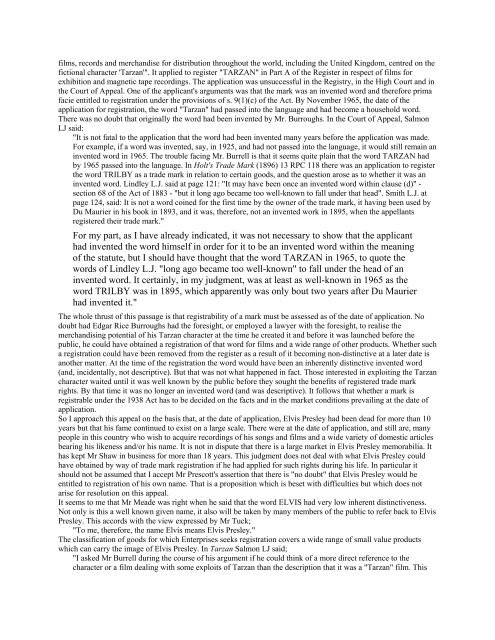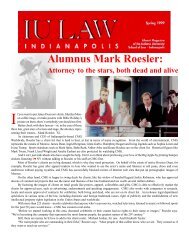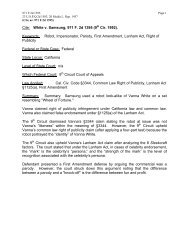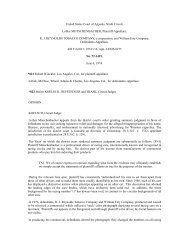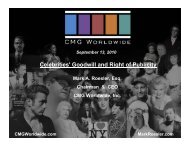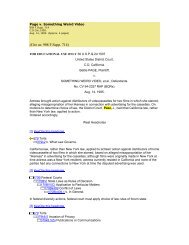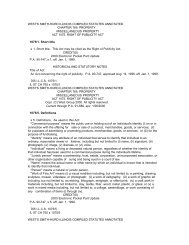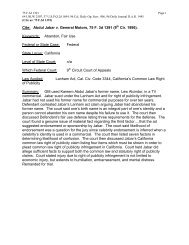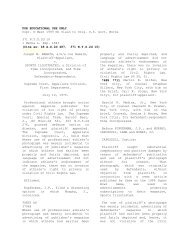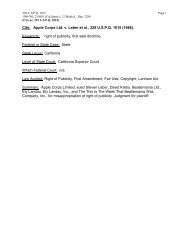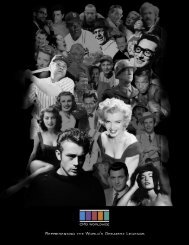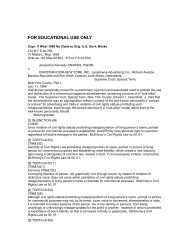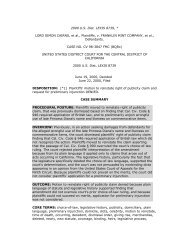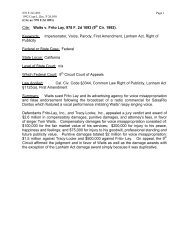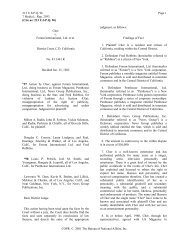Elvisly Yours v. Elvis Presley Enterprises Inc. - Mark Roesler
Elvisly Yours v. Elvis Presley Enterprises Inc. - Mark Roesler
Elvisly Yours v. Elvis Presley Enterprises Inc. - Mark Roesler
Create successful ePaper yourself
Turn your PDF publications into a flip-book with our unique Google optimized e-Paper software.
films, records and merchandise for distribution throughout the world, including the United Kingdom, centred on thefictional character 'Tarzan'". It applied to register "TARZAN" in Part A of the Register in respect of films forexhibition and magnetic tape recordings. The application was unsuccessful in the Registry, in the High Court and inthe Court of Appeal. One of the applicant's arguments was that the mark was an invented word and therefore primafacie entitled to registration under the provisions of s. 9(1)(c) of the Act. By November 1965, the date of theapplication for registration, the word "Tarzan" had passed into the language and had become a household word.There was no doubt that originally the word had been invented by Mr. Burroughs. In the Court of Appeal, SalmonLJ said:"It is not fatal to the application that the word had been invented many years before the application was made.For example, if a word was invented, say, in 1925, and had not passed into the language, it would still remain aninvented word in 1965. The trouble facing Mr. Burrell is that it seems quite plain that the word TARZAN hadby 1965 passed into the language. In Holt's Trade <strong>Mark</strong> (1896) 13 RPC 118 there was an application to registerthe word TRILBY as a trade mark in relation to certain goods, and the question arose as to whether it was aninvented word. Lindley L.J. said at page 121: "It may have been once an invented word within clause (d)" -section 68 of the Act of 1883 - "but it long ago became too well-known to fall under that head". Smith L.J. atpage 124, said: It is not a word coined for the first time by the owner of the trade mark, it having been used byDu Maurier in his book in 1893, and it was, therefore, not an invented work in 1895, when the appellantsregistered their trade mark."For my part, as I have already indicated, it was not necessary to show that the applicanthad invented the word himself in order for it to be an invented word within the meaningof the statute, but I should have thought that the word TARZAN in 1965, to quote thewords of Lindley L.J. "long ago became too well-known" to fall under the head of aninvented word. It certainly, in my judgment, was at least as well-known in 1965 as theword TRILBY was in 1895, which apparently was only bout two years after Du Maurierhad invented it."The whole thrust of this passage is that registrability of a mark must be assessed as of the date of application. Nodoubt had Edgar Rice Burroughs had the foresight, or employed a lawyer with the foresight, to realise themerchandising potential of his Tarzan character at the time he created it and before it was launched before thepublic, he could have obtained a registration of that word for films and a wide range of other products. Whether sucha registration could have been removed from the register as a result of it becoming non-distinctive at a later date isanother matter. At the time of the registration the word would have been an inherently distinctive invented word(and, incidentally, not descriptive). But that was not what happened in fact. Those interested in exploiting the Tarzancharacter waited until it was well known by the public before they sought the benefits of registered trade markrights. By that time it was no longer an invented word (and was descriptive). It follows that whether a mark isregistrable under the 1938 Act has to be decided on the facts and in the market conditions prevailing at the date ofapplication.So I approach this appeal on the basis that, at the date of application, <strong>Elvis</strong> <strong>Presley</strong> had been dead for more than 10years but that his fame continued to exist on a large scale. There were at the date of application, and still are, manypeople in this country who wish to acquire recordings of his songs and films and a wide variety of domestic articlesbearing his likeness and/or his name. It is not in dispute that there is a large market in <strong>Elvis</strong> <strong>Presley</strong> memorabilia. Ithas kept Mr Shaw in business for more than 18 years. This judgment does not deal with what <strong>Elvis</strong> <strong>Presley</strong> couldhave obtained by way of trade mark registration if he had applied for such rights during his life. In particular itshould not be assumed that I accept Mr Prescott's assertion that there is "no doubt" that <strong>Elvis</strong> <strong>Presley</strong> would beentitled to registration of his own name. That is a proposition which is beset with difficulties but which does notarise for resolution on this appeal.It seems to me that Mr Meade was right when he said that the word ELVIS had very low inherent distinctiveness.Not only is this a well known given name, it also will be taken by many members of the public to refer back to <strong>Elvis</strong><strong>Presley</strong>. This accords with the view expressed by Mr Tuck;"To me, therefore, the name <strong>Elvis</strong> means <strong>Elvis</strong> <strong>Presley</strong>."The classification of goods for which <strong>Enterprises</strong> seeks registration covers a wide range of small value productswhich can carry the image of <strong>Elvis</strong> <strong>Presley</strong>. In Tarzan Salmon LJ said;"I asked Mr Burrell during the course of his argument if he could think of a more direct reference to thecharacter or a film dealing with some exploits of Tarzan than the description that it was a "Tarzan" film. This


